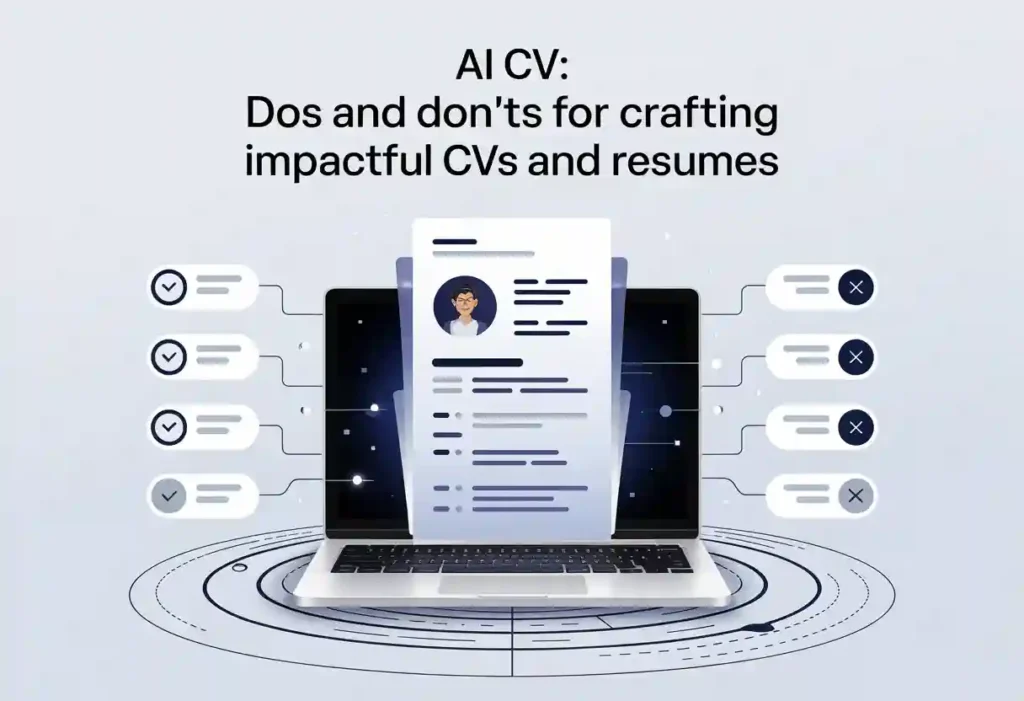Exuding Confidence: How to Master Your Job Interview
Sweaty palms, a racing heart, and a mind filled with doubt and anxiety. That’s the typical state of the unemployed about to embark on an interview. If you’ve ever been in those shoes, you know the feeling too well.
The pressure to make a good impression, the fear of stumbling over your words, and the uncertainty of whether you have what it takes to land the job.
In this comprehensive guide, we’ll unlock the mysteries of the competency-based interview. This guide will equip you with the tools and knowledge to conquer competency-based questions.
We’ll share motivational insights and practical strategies. These tools can help you overcome your interview fears and confidently answer competency questions.
By the end of this guide, you’ll emerge not only as a confident interviewee but as a candidate ready to showcase your true worth.
Expert Advice
Competency questions vary widely but often fall into specific categories, including:
- Adaptability
- Commercial Awareness
- Communication
- Creativity
- Leadership
- Organization
- Responsibility
- Teamwork
- Technical Skills
Competency-based interviews are beneficial for interviewing recent graduates, career switchers, and anyone with limited work experience.
Most people can give at least one personal experience for each type of competency-based question.
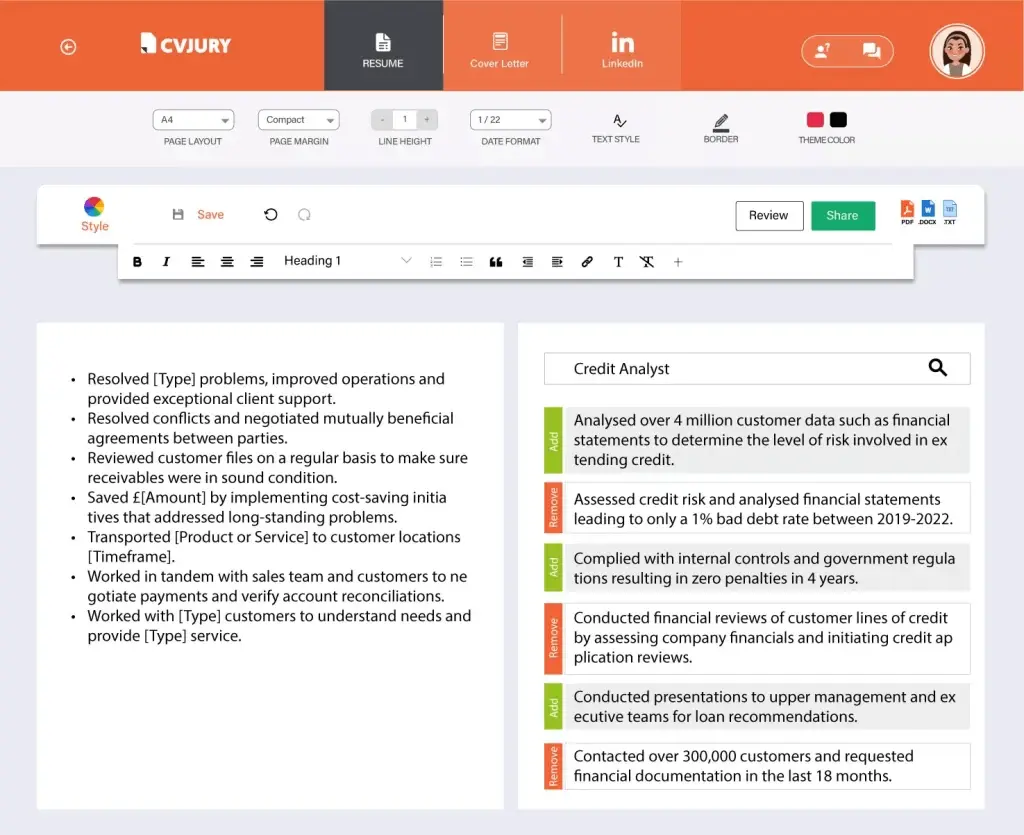
Understanding Competency-Based Job Interview Questions: What Are They, And Why Are They Used?
We examine the concept more deeply and why interviewers use the technique.
What Is A Competency-Based Interview?
First, it’s essential to understand a competency-based interview and how it differs from a regular interview.
Interviewers design competency-based questions to test your skills, abilities, and behaviors. They focus on your past experiences and how you showed specific competencies in various situations.
Instead of hypothetical questions, employers ask about actual scenarios. They want concrete evidence of your capabilities.
Imagine you’re going for an interview. Instead of the usual questions like, “Tell me about yourself,” the interviewer asks you something different.
She asks, “Describe a time when you had to solve a complex problem using your problem-solving skills and knowledge. ” This is a competency-based interview question.
In a competency interview, they ask questions to understand if you have the right skills, abilities, and experience for the position. They want answers based on the knowledge that you acquired from past experiences.
These questions often start with phrases like, “Tell me about a time when…” or “Give me an example of…” The idea is to share a real-life experience where you faced a challenge or accomplished something.
By responding to questions like these, you show the interviewer that you have the skills they need.
For example, excellent customer service skills are a critical competency of the role. The interviewer might ask you to describe a situation in which you had to deal with a difficult person and how you resolved the issue.
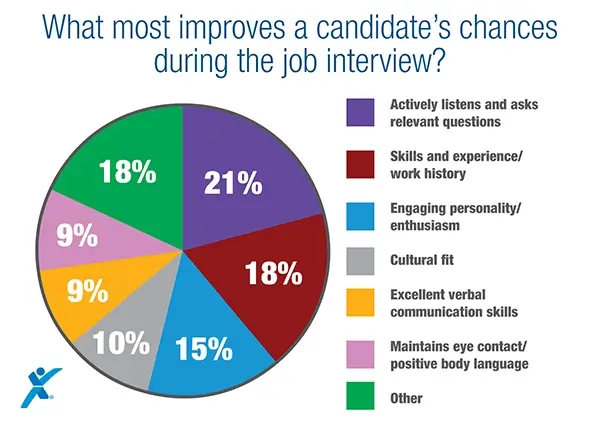
Remember!
The key is to use specific real-life examples or past experiences to show your abilities. Show the interviewer your knowledge and working style. And that you fit the selection criteria.
Why Are Competency-Based Job Interview Questions Used In Interviews?
Competency interview questions provide employers a reliable way to assess your suitability for the role.
They offer invaluable insights into your ability to:
- handle challenges
- work well within a unit
- adapt to changing circumstances
- demonstrate critical competencies crucial to success
Many employers can make more informed hiring decisions by focusing on real-life examples. This reduces the risk of hiring solely based on qualifications, credentials, or academic work.
Depending on the position and organization, hiring managers seek a range of competencies and specific skills. While the desired competencies may vary, some common competencies include:
- Good communication
- Problem-solving
- Adaptability
- Teamwork
- Leadership skills
- Decision-making
- Time management
- Customer service skills
- Technical capabilities
Remember!
Be confident and authentic when sharing your experiences. Everyone has unique skills and strengths, and key competency questions allow you to showcase yours.
So, embrace the opportunity and tell your stories. Show them you’re the perfect fit for the position. If you can solve problems, prove it. If you provided excellent customer service, show them.
How about clarity of thought and excellent communication skills? Tell them. Better still, show it.

Competency questions are essential because they:
- Assess your overall abilities and fit for the role
- Focus on specific job requirements
- Predict your future performance
- Target critical skills and qualities
- Provide insights into behaviors and problem-solving abilities
- Ensure consistent evaluation
- Evaluate the cultural fit
- Showcase your soft skills
- Help you stand out from other candidates
- Promote personal growth and reflection
Preparing for a Competency-Based Interview: Tips and Strategies
- Know the job: Understand the particular competencies and abilities required for the position you’re applying for. Make sure your examples match these requirements.
- Discover your strengths: Consider when you did well and showed essential skills in your previous position. Remember these strengths to talk about during the interview.
- Prepare examples: Think of work-related scenarios where you faced conflicts. Think of situations where you achieved something or used specific skills. Have a few examples ready to share.
- Practice with mock interviews: Ask someone you know to pretend they’re interviewing you. Practice answering questions and speaking confidently.
- Learn about the company: Find out what the company is all about. Understand their values and mission, and discuss how you will fit in as a team member.
- Know the skills: Learn about the critical skills employers look for. Practice talking about how you have those skills using real examples.
- Keep it clear and short: Respond to competency questions directly, and don’t talk too much.
- Stay calm and believe in yourself: Remember to stay calm during competency interviews. Look the interviewer in the eye, speak clearly, and believe in your abilities.
- Use a structure: For instance, during your competency interviews, frame your responses using the BACAR, STAR, or SARI technique.
Preparing for a competency-based interview requires careful consideration and practice. These tips and strategies can boost confidence and showcase your skills and experiences.
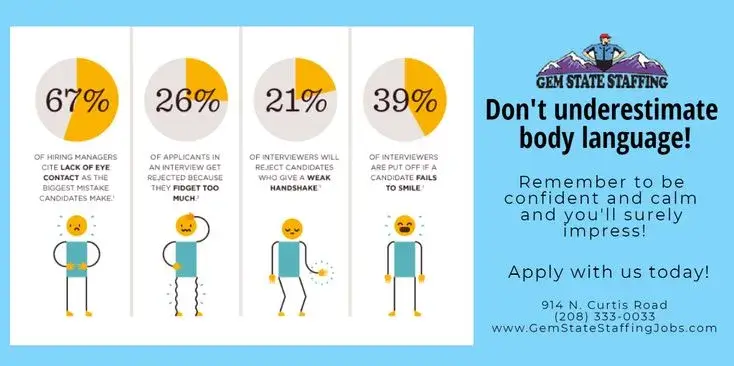
How to Respond to Competency Questions
Now you have a good grasp of the tips and strategies to prepare for a competency-based interview. Time to dive deeper into three powerful techniques that can enhance your interview performance.
These are the BACAR technique, the STAR method, and the SARI.
These frameworks provide a structured approach to your responses. They allow you to highlight your competencies and provide examples.
Using these techniques, you can show your abilities.
The BACAR, STAR and SARI Techniques
What is the BACAR Technique?
The BACAR technique helps structure your responses to competency questions. It enables you to provide a concise yet comprehensive response that showcases your skills and experiences.
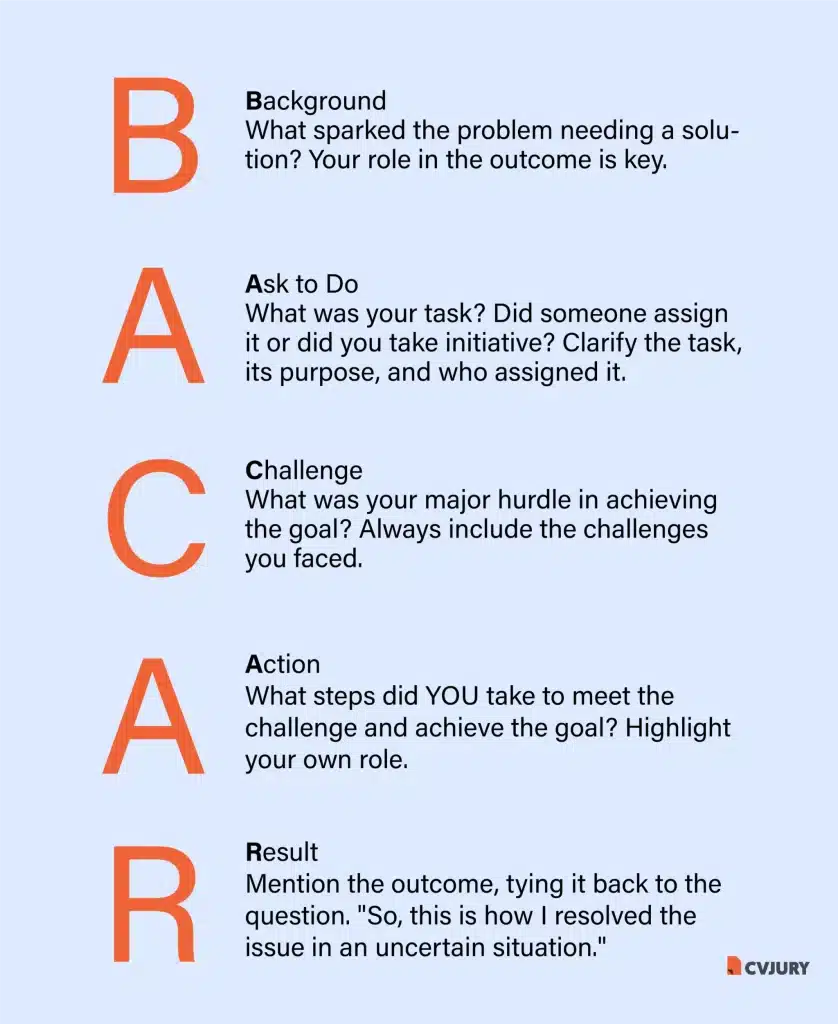
When using the BACAR technique:
- Begin by providing a brief background of your situation or task
- Then, explain what you were asked to do
- And the challenges you encountered
- Next, outline your specific actions to address the challenges, emphasizing your role and individual contribution
- Finally, share the result or outcome of your actions, highlighting the positive impact you made
Introducing the STAR method
The STAR technique is the most popular framework for answering competency-based interview questions. We highlight what each letter stands for below:
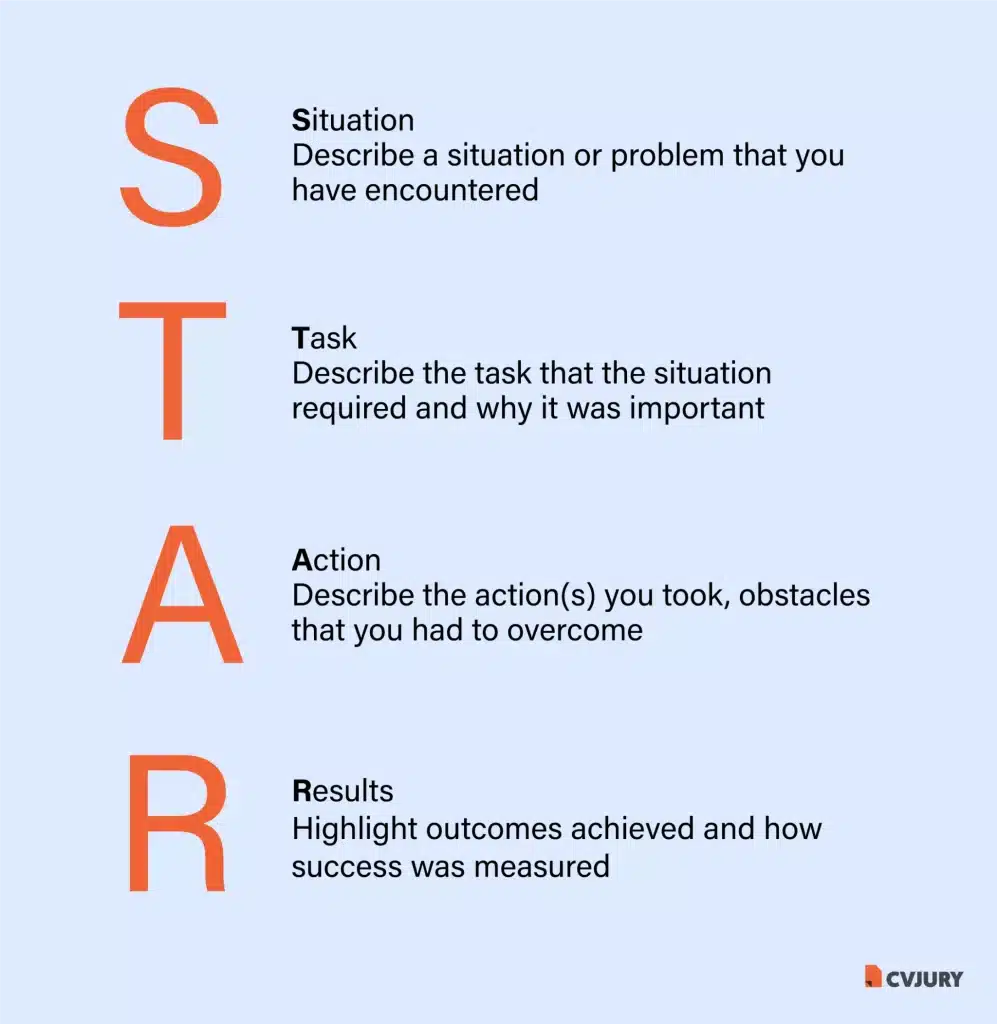
What is the SARI Competency Interview Question Answering Strategy?
The SARI framework, like BACAR, can be practical for answering interview questions. It offers an efficient way of presenting your experiences, skills, and achievements.
It’s a simple yet powerful storytelling technique to demonstrate your capabilities in practice.
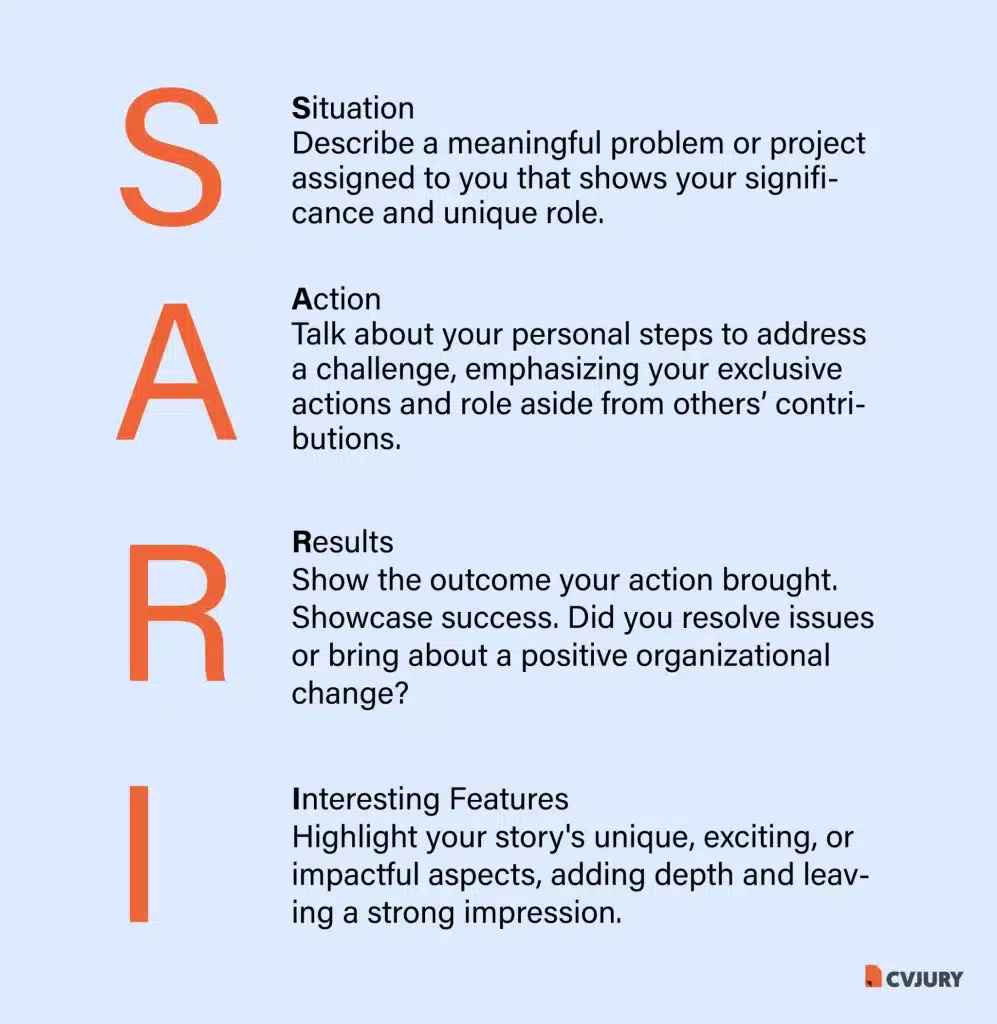
Here’s how you can use it to frame competency interview answers:
Situation (or Task): This is equivalent to the BACAR technique’s ‘Background’ and ‘Ask to Do.’ Start by describing the context or the task that you were given.
This could be a problem that required resolution or a project you were assigned. It could even be a challenge you need to overcome. It’s crucial to explain why the situation was significant and your specific role within it.
Action: Like the ‘Action’ in BACAR, it’s all about what you did in that situation or task. What steps did you take to address the problem or complete the task?
This is the moment to emphasize your role and actions. Remember, they want to know what YOU did, not your colleagues or boss.
Result: Similar to the ‘Result’ in BACAR, explain the outcome of your actions. This could be a successful project completion.
Or a problem resolved, or a positive organizational change. If you have achieved results from your efforts, it can demonstrate your ability to make an impact.
Interesting Features (a bonus): This is an extra touch not found in BACAR. You can highlight any exciting story, unique or impressive aspects, an unexpected outcome, or a special recognition you received.
Or how you grew from the experience. This adds depth to your story and leaves a lasting impression.
Using the SARI framework is like telling a compelling story with you as the main character. It helps to frame your experiences and skills in a way that is easy to understand.
It makes your account memorable, providing the perfect structure to shine during your interviews.
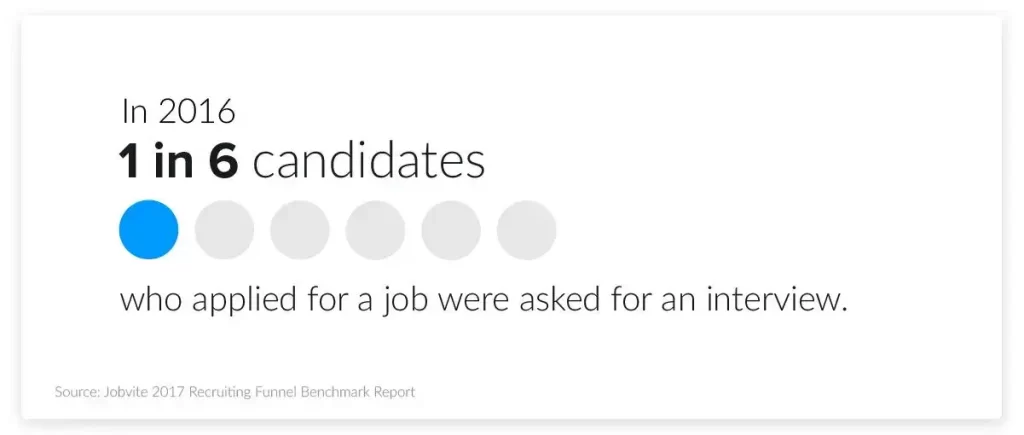
Why you should use these techniques:
Using these frameworks to address competency interview questions offers several benefits:
- Structure and organization: These techniques provide a structured framework for crafting your response. They make sure that you cover all the necessary elements in a clear and organized way. You can stay focused. And avoid rambling or going off-topic during the interview.
- Highlighting competencies: These frameworks allow you to showcase essential qualities like:
- problem-solving abilities
- adaptability
- ability to work in a team
- leadership
Employers value these.

- Clarity and conciseness: Always adhere to a structured format. Only then can you communicate your experiences and achievements. This ensures that the interviewer understands the impact of your actions.
- Focus on individual contributions: The BACAR, STAR, or SARI techniques enable you to emphasize your contributions within a group setting. You can explain your role and decision-making process. You can also tell them what actions you took to address challenges. Or how you accomplished a difficult task. This highlights your unique skills and contributions.
- Interviewer engagement: You concisely respond by capturing the interviewer’s attention and keeping them engaged throughout the interview. This can leave a positive and lasting impression, making you a memorable candidate.
Remember!
Once you understand the benefits, knowing how to use these techniques in your interview is essential.
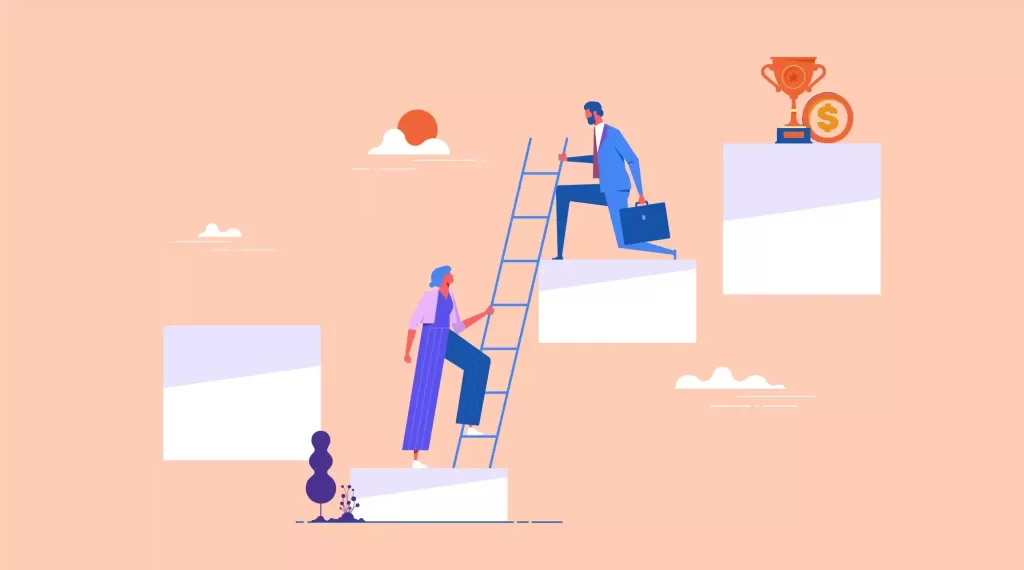
How to Use the BACAR, STAR, and SARI Techniques: A Step-by-Step Guide
- Identify relevant competencies: Start by understanding the key competencies. You need to understand the skills the employer requires for the position you’re applying for. Identify those that align with your experiences and strengths.
- Prepare examples: Think of work-related scenarios where you
- faced challenges
- achieved significant results
- used specific skills
Prepare a few examples that align with the identified competencies. Make sure that they are concise and impactful.
- Understand the framework: Study the structure and parts of the BACAR technique, the STAR approach, or the SARI.
- Practice and refine: Practice using these techniques by incorporating them into your mock interviews. Rehearse your responses to common competency-based interview questions. Ensure you follow the framework and deliver your answers like a sharpshooter, not missing her target.
- Tailor answers to the post: Customize your responses using these approaches. They need to align with the specific requirements of the role. And the competencies sought by the employer. Focus on the relevant aspects of your industry experience that showcase your fit for the position.
- Keep it focused: During the interview, remember to keep your answers focused on the competencies being assessed. Be mindful of time constraints and avoid going into excessive detail. Maintain a balance between providing enough context and delivering your main points.
- Seek feedback and iterate: After each mock interview or practice session, seek input from friends, mentors, or career advisors. Add their suggestions and reframe your answers to improve your storytelling and delivery.
By following these steps, you can:
- Show your competencies
- engage the interviewer and
- increase your chances of success
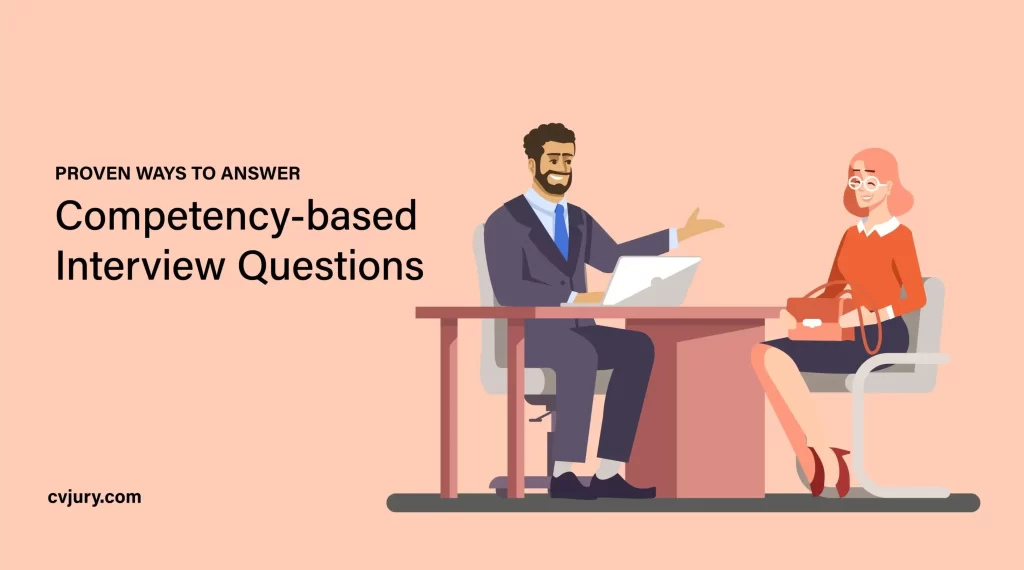
16 Common Competency-Based Job Interview Questions [With Sample Answers]
We understand that preparing for competency-based interviews can be challenging. To help out, we’ve compiled a list of common competency-based interview questions.
Each interview question is designed to assess specific skills and abilities hiring managers seek. Check out the following categories to understand the purpose behind each question. You’ll also find different example responses:
Communication and customer focus:
Question 1:
Tell us about your experiences with a demanding customer. And how you used your skills to resolve the problem successfully.
Skill tested: Customer service and problem-solving.
Example Answer:
In my previous position as a customer service representative, I had a challenging customer who was unhappy with our product. I listened to their concerns and empathized with their frustration.
Then I offered a personalized solution, ensuring their satisfaction in the end.
Question 2:
Provide an example of a time that required you to adapt your communication on a particular issue for different audiences.
Skill tested: Adaptability and communication.
Example Answer:
My boss asked me to explain technical details during a project presentation. The problem was that the audience was non-technical. I changed my language and used relatable examples to avoid jargon and ensure everyone understood the key points without feeling overwhelmed.
Question 3:
Tell us about a challenge you’ve recently encountered at work and how you overcame this challenge.
Skill tested: Problem-solving and resilience.
Example Answer:
Our team faced unexpected obstacles in a short timeline. To overcome this challenge, I facilitated open communications and brainstormed alternative solutions. Then I delegated tasks, achieving our goal through collaborative problem-solving.
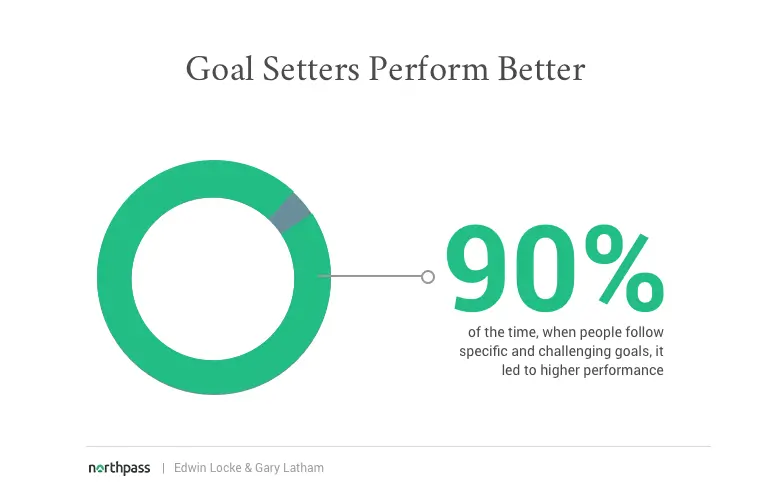
Strategic thinking:
Question 4:
Explain how you can ensure that your department’s goals align with the company’s goals.
Skill tested: Alignment of goals.
Example Answer:
I communicate with key stakeholders, analyze market trends, and seek feedback from cross-functional teams. This alignment plays a significant part in driving cohesive and coordinated efforts.
Question 5:
Tell us about a new idea you have implemented in the past year. Explain how this supported the company’s goals or the team’s objectives.
Skill tested: Innovation and goal alignment
Example Answer:
I recognized the need for process optimization and introduced a new software tool. This tool automates manual tasks, eliminating the need for employees to write a daily sales report.
This resulted in significant time and cost savings for the team, aligning with our company’s goal of improving operational efficiency.
Question 6:
Tell us about a project you have contributed to that required you to consider the broader impact.
Skill tested: Considering the broader impact.
Example Answer:
I collaborated with various departments while working on a sustainability initiative. We were asked to implement eco-friendly practices. This product considers our environmental impact, brand reputation, and customer perception. It resulted in positive outcomes for the company.
Team and people management:
Question 7:
Describe a situation in which you inspired trust and respect in your team.
Skill tested: Leadership and trust-building.
Example Answer:
As a team leader, I promoted an open and inclusive culture. I encouraged feedback and recognized individual contributions. I also looked for and provided opportunities for professional development.
By fostering a supportive environment, I inspired trust and respect among team members. This led to increased team effort and improved performance.
Question 8:
Describe a time when you effectively dealt with a problematic/ sensitive situation relating to one of your direct reports.
Skill tested: Conflict resolution and interpersonal skills.
Example Answer:
I encountered a conflict between team members with differing opinions on a project. I initiated a private conversation and listened to both parties. Then, I facilitated open dialogue and helped them find common ground.
I restored harmony within the team through effective communication and conflict-resolution strategies.
Effective organization and achieving results:
Question 9:
Tell us about a time when it was challenging to meet a tight deadline. How did you achieve your goal?
Skill tested: Goal-oriented and time management.
Example Answer:
Due to unforeseen delays during a demanding project, I faced a tight deadline. To ensure timely completion, I prioritized tasks and delegated responsibilities.
I also communicated with stakeholders. This led to delivering high-quality results within the given timeframe.
Question 10:
How do you manage time and priorities?
Skill tested: Time management and prioritization.
Example Answer:
I use various techniques, including crafting task lists and setting realistic deadlines. I also use digital tools for scheduling and reminders (e.g., Todoist). By assessing priorities often and reevaluating timelines, I ensure I stay organized and meet deadlines.
Question 11:
Tell us about when you completed a project or work while there were other competing priorities.
Skill tested: Multitasking and results-oriented attitude.
Example Answer:
In a busy work environment, I had to balance multiple projects simultaneously. To manage competing priorities, I used time-blocking techniques, such as the Eisenhower matrix, the Pomodoro technique, and time boxing.
I delegated tasks when appropriate and maintained open communication with stakeholders. By staying focused and managing my time efficiently, I completed all projects within their deadlines.

Question 12:
Describe your most significant achievement at work.
Skill tested: Achievement and impact.
Example Answer:
Leading a cross-functional team to implement a new system was one of my most outstanding achievements. It was a customer relationship management (CRM) system.
This improved communication, streamlined processes, and enhanced customer satisfaction. In the end, customer retention increased by X%, and revenue grew by X%.
Question 13:
Describe a time when you urgently prioritized a last-minute request from a customer or colleague. How did you manage the rest of the workload?
Skill tested: Handling urgent requests and workload management.
Example Answer:
When faced with an urgent customer request, I immediately assessed its importance and impact. I reprioritized my tasks and communicated the situation to a co-worker.
I also collaborated to redistribute the workload effectively. I successfully met the urgent request by:
managing expectations
coordinating efforts
maintaining focus
while also managing the remaining workload
Teamwork and collaboration:
Question 14:
Provide an example of a time you worked as a significant part of a successful team. What made the team successful?
Skill tested: Collaboration and teamwork.
Example Answer:
I worked with team members from different backgrounds on a cross-departmental project. They each contributed a unique perspective.
Our team’s success stemmed from effective communication, active listening, and excellent service delivery.
We were simply respecting each other’s expertise. We completed the project by leveraging diverse skills and fostering a supportive environment.
Question 15:
Describe when you had to work with a group of people with different views on a particular issue. How did you come to a final agreement?
Skill tested: Conflict resolution and consensus building.
Example Answer:
During a brainstorming session, our team had diverse opinions. To reach a consensus:
I facilitated constructive discussions
Encouraged everyone to express their ideas
Identified common ground
I valued each team member’s perspective, and we found shared objectives
In doing so, we developed a campaign incorporating the best elements from all viewpoints.
Question 16:
Describe when you completed a work/project with people outside your immediate team.
Skill tested: Collaboration beyond the immediate team.
Example Answer:
I collaborated with colleagues from different departments. We launched a company-wide employee engagement initiative. We successfully implemented the initiative by:
effective cross-functional communication channels
leveraging our collective expertise
ensuring transparent collaboration
This increased employee satisfaction and productivity.
Remember!
These example answers are meant to inspire you and provide a framework. You should craft your answers to competency interview questions based on your experiences.
Tailor your expert answers to showcase your unique skills and achievements. Don’t forget to practice delivering them confidently before your interview.
Top Tip
Read the job description carefully before the interview. This should give you an idea of the skills and core competencies the employer will seek.
List these skills and competencies, then consider a good example for each. You can never be over-prepared for an interview.
Plan your responses to specific competency interview questions, and you are setting yourself up for success.
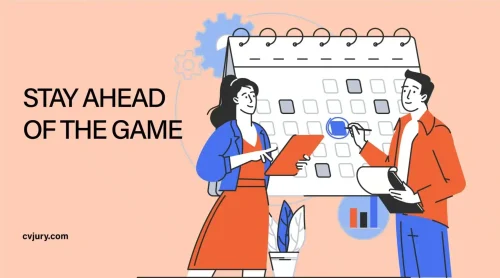
For more tips on answering different interview questions and general interview advice, visit our Job Interview Tips Blog.
Alternatively, sign up for an account so you don’t miss a single update.
Essential Things To Remember About Competency-Based Job Interview Questions
Dos
- Concentrate on the action, what you did, and your role in each example. Assessors or interviewers want to hear about what you did more than others.
- Keep your response focused and concise.
- Read the job description carefully for clues about the interviewer's questions.
- Prepare examples for each competency and practice answering competency-based interview questions.
- Make sure your response flows. You can structure it using the BACAR, STAR, or SARI techniques, but remember to respond like a human, not a robot.
- Use specific examples and actions for each competency-based question instead of giving generic responses that make you sound like any other candidate.
Don'ts
- Don't go off-topic. Competency-based questions are particular because the interviewer wants a precise response.
- Avoid making your response too long. You should be able to answer a competency-based interview question in around two to three minutes.
- Generic statements like ‘the team improved’ or ‘things worked better’ won't impress. Explain how you know the team improved and why things worked better.
- Don’t fail to reflect: failing to reflect on actual experiences weakens examples. Dig into your past to find strong, related stories.
- Avoid ignoring failures: Talking about only successes can look fake. Add how you used challenges to improve your skills and professional growth.
Mastering Competency-based Interviews: Your Path To Success
Congratulations! You’re now equipped with invaluable insights and strategies to excel in competence-based interviews. With preparation as your key to success, these tips and techniques will help you ace your next interview.
Did you know? According to the Society for Human Resources Management, about 82% of organizations use competency-based interviewing in their hiring process.
So mastering these interviews is essential. This will maximize your chances of landing your dream employment.
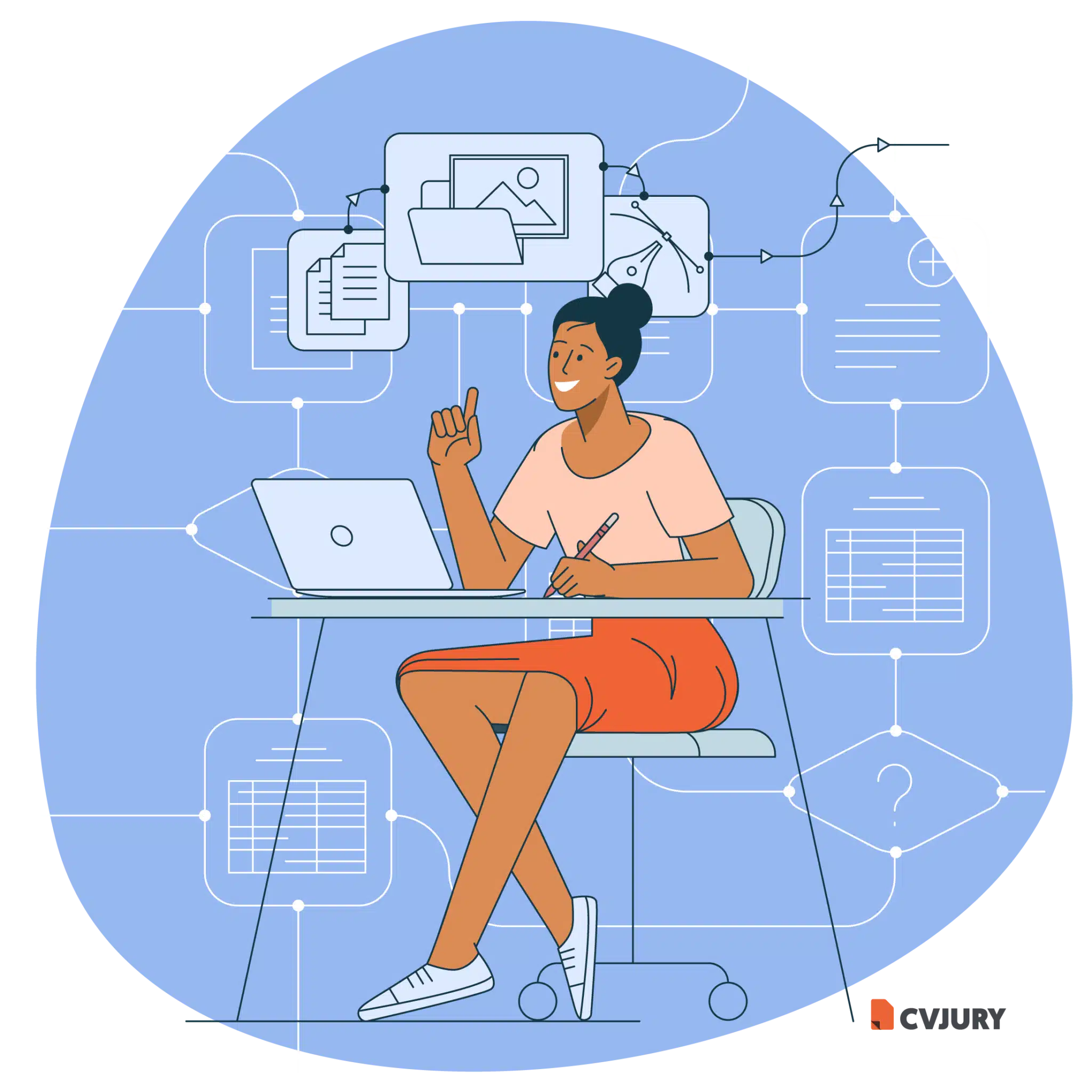
Remember!
You must understand the role’s ‘person specification’ and align your strengths and work style with the requirements.
This will give you a competitive edge. Especially when applying for senior roles. Prepare relevant examples. These will demonstrate:
- leadership
- strategic thinking
- ability to drive results
Practice with mock interviews and refine your responses. Use the BACAR, STAR, or SARI techniques to effectively showcase your skills and accomplishments.
Highlight your unique contribution and demonstrate how you navigate complex challenges. Then you’ll leave a lasting impression on hiring managers.
Believe in yourself, stay calm, and let your genuine passion and qualifications shine through.
Every interview is a valuable learning experience, regardless of the outcome.
You’ve got this! Seize this opportunity to shine and showcase your competencies with confidence.
Good luck with your job search, and may your future be filled with success and fulfillment.
Now, go out and land that job of your dream!
For more inspiration, watch how Richard McMunn attempts to answer competency-based questions using the STAR method as a guideline.
Want to land more interviews and your desired role? Then, learn how to write a resume like a guru.
Related Reading: Competency-based Job Interview Questions and Answers
8 Quick Interview Questions & How to Answer Them
Use our free resume scanner to beat the ATS
Free online resume builder

